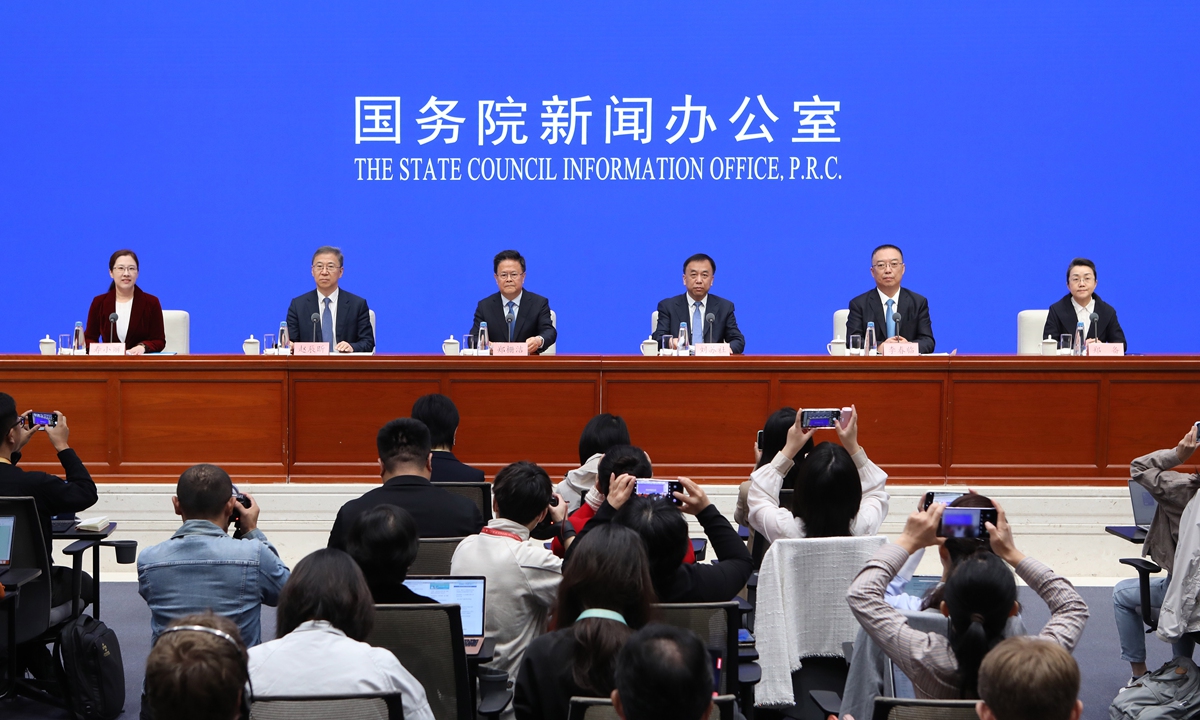China’s economic planner vows to step up efforts to introduce a package of incremental policies

Zheng Shanjie (third from left), head of the National Development and Reform Commission, together with other officials hold a press conference on China's economy on October 8, 2024 in Beijing. Photo: VCG
The National Development and Reform Commission (NDRC), China's top economic planner, vowed on Tuesday that it will step up efforts to introduce a package of incremental policies, including an emphasis on scaling up macro counter-cyclical adjustments, boosting domestic consumption, and shoring up capital markets - among others - as part of the efforts to steadily promote economic growth.Observers said the remarks, coming on the first working day of the fourth quarter, underscore Chinese policymakers' strong resolve to address economic challenges head-on and to sustain economic recovery in the rest of the year. It also sheds light on the ample policy toolkits the central government has in hand to deal with complex internal and external environments, they noted.
The support adds to a series of pro-growth policies rolled out since late September, which further lifts social expectations and market confidence. A consumption spree was witnessed during the just concluded weeklong National Day holidays in addition to a stock market rally which has lasted for several consecutive days.
Wide-ranging policies
"In response to the new situations and issues in the current economic operation, China will intensify efforts to introduce a package of incremental policies to promote sustained economic recovery and improvement," NDRC head Zheng Shanjie said on Tuesday.
The remarks came at a highly anticipated press conference of the State Council Information Office on Tuesday. In addition to Zheng, other four NDRC deputy heads attended the press conference, which some economists said was a "rare case" and shows that the "incremental policies will take effect on all fronts."
Zheng in particular highlighted five aspects, including strengthening counter-cyclical adjustments in macroeconomic policies, focusing policies on improving livelihoods and boosting consumption, more support to help businesses facing difficulties, more efforts to stabilize the real estate market, as well as more efforts to shore up capital markets.
"The slew of policies are targeted, not only serving as an effective response to the current emerging economic downward pressure, but they also represent a strategy to achieve China's high-quality development in the long-term," Zhu Keli, founding director of the China Institute of New Economy and executive director of the China Information Industry Association, told the Global Times on Tuesday.
The wide-ranging measures coordinate policy priorities of this year with next year, which also carry great significance for the healthy and sound development of the economy in 2025, as well as the successful delivery of the 14th Five-Year Plan (2021-2025) targets, Li Qingbin, a research fellow at the Institute of Economic Research under the NDRC, told the Global Times on Tuesday.
On September 26, the Political Bureau of the Communist Party of China (CPC) Central Committee held a meeting to analyze the current economic situation of China and make further plans for economic work. The meeting called for effectively implementing existing policies, stepping up efforts to "roll out incremental policies" and further making policy measures more targeted and effective.
"From setting a direction to systematic implementation, we're seeing clear and concerted efforts. Those moves send a resounding signal of Chinese policymakers' determination to stabilize growth and achieve the annual growth target," Tian Yun, a veteran economist based in Beijing, told the Global Times on Tuesday.
During the press conference, Zheng used two keywords to summarize the status quo of the Chinese economy: "steady" and "progress." He expressed full confidence in China achieving the tasks and the goals set for economic and social development in 2024.
Rising confidence
According to Tian, a policy introduction on Tuesday, the first working day after the weeklong National Day holidays, plays a vital role in properly guiding social expectations over the prospects of the world's second-largest economy.
China's A-share market experienced another significant surge on Tuesday. The ChiNext Index recorded its largest single-day gain on record, while total trading volume on the Shanghai and Shenzhen stock exchanges reached 3.45 trillion yuan ($488.9 billion), an increase of 860 billion yuan from the previous trading day, setting a new historical high.
Alongside the stock market rally, Chinese assets are witnessing increasing fund inflows from foreign investors, while a number of foreign institutions have upgraded their predictions for Chinese stocks.
Goldman Sachs Group forecasted in early October that gauges tracking China's equities may rise another 15 percent to 20 percent if "authorities deliver on policy measures." Morgan Stanley also forecasted at least another 10 percent stock-market rally in the near term.
According to Bloomberg, inflows to five US-listed leading ETFs that invest in Chinese stocks received about $4.9 billion in cash in the week ended October 4, the most on record.
"Recent stimulus policies have put an emphasis on maximizing the synergy effect between different policies, including fiscal, financial, consumption, investment and property ones," Li Qingbin said. Analysts expect the country's top economic planner to play the role of a policy coordinator between different departments.
According to Zheng, with regard to fiscal policies, China plans to roll out more investment projects, including front-loading 100 billion yuan ($14.2 billion) from next year's central government budget and another 100 billion yuan to be used for key investment projects by the end of this year.
Additionally, the 1 trillion yuan of ultra-long special treasury bonds, which fund major national strategies and support security-capability as well as support large-scale equipment upgrades and trade-in of consumer goods, has been fully allocated to the projects and local governments, Zheng said, noting that China will continue issuing ultra-long special treasury bonds in 2025.
Tian said he expects more policies with "greater strength and intensity" could be rolled out, depending on how the Chinese economy operates in the fourth quarter and the evolving downward pressure.




